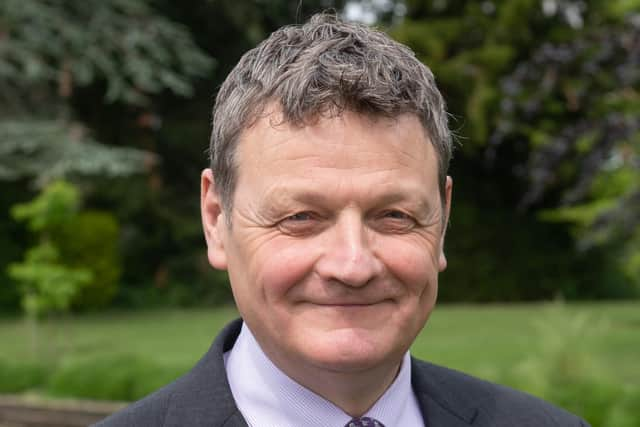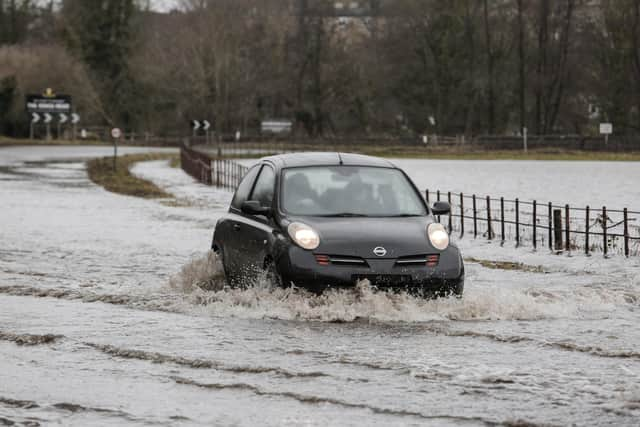How people in North Yorkshire can help to develop new council’s climate change strategy
and live on Freeview channel 276
Residents, businesses and community and voluntary groups are being given the opportunity to comment during a public engagement campaign that is being launched today (February 13) in North Yorkshire.
A climate change strategy is set to be adopted by the new North Yorkshire Council, which launches on April 1, and the consultation is now seeking the public’s views on the draft document.
Advertisement
Hide AdAdvertisement
Hide AdPeople are being asked to highlight measures which they have already taken to combat climate change such as opting to use an electric vehicle, adopting renewable energy in their homes and businesses, and also increasing recycling and reducing waste.


They are also being urged to pinpoint issues that are preventing them from taking further action, such as the cost of adopting environmentally-friendly measures, a lack of time to change their lifestyles and whether they are waiting for new technology to evolve.
North Yorkshire County Council’s executive member for climate change, Cllr Greg White, said: “The need to tackle climate change will be at the forefront of the new council’s policies, and we recognise that this is the biggest challenge that we face both in North Yorkshire and as a country as a whole.
“The engagement with the public will be a key exercise to help ensure that we can prioritise the work that will be undertaken to reduce carbon emissions and help curb the impact of changes in our climate.
Advertisement
Hide AdAdvertisement
Hide Ad“I would ask everyone in North Yorkshire to take the opportunity to express their views, as climate change is an issue that affects all of us, no matter what walk of life we are in.


“We will listen to the views of the public, which will form an important part of how the new council develops its policies and works to reduce the impact of climate change.”
Cllr White did, however, acknowledge that the new council is facing significant financial challenges that will impact on services across the authority. It is estimated that there will be a shortfall of more than £30 million in the council’s revenue budget for the next financial year, which will have to be covered by the one-off use of reserves after some additional savings have also been introduced.
The public engagement will be conducted over eight weeks until April 7 and the consultation will be available online as well as in libraries.
Advertisement
Hide AdAdvertisement
Hide AdA series of online events are being organised to help people to access information, including a session with town and parish councils today. Two further online events will be held on March 9, one in the afternoon with voluntary and community groups in partnership with Community First Yorkshire and then another with residents and businesses in the evening of the same day.
The draft strategy has set out three key objectives to reduce greenhouse gas emissions, to prepare North Yorkshire for a changing climate and also to support nature to thrive.
The document identifies the county’s vast natural resources as vital to helping prevent the growing threat of climate change, using trees, hedgerows, grasslands, peat bogs and seaweed to store carbon dioxide in so-called “organic sinks”.
Other proposed measures to ensure that North Yorkshire Council achieves an ambition of reaching carbon net zero by 2030 include reducing energy demand and an increasing focus on low carbon energy such as solar power as an alternative to fossil fuels.
Advertisement
Hide AdAdvertisement
Hide AdWork is set to introduce environmentally-friendly measures in buildings ranging from homes to businesses and premises used by the public sector to cut down on the use of energy and promote sustainable heating and power. A move to greener modes of travel is also seen as vital to tackling climate change, with improvements planned to public transport while encouraging more people to walk and cycle.
Figures show that North Yorkshire produced 5,829 kilotonnes of carbon dioxide equivalents (kt co2e) in 2020, with agriculture equating to a third of the total, transport responsible for 28 per cent and 19 per cent coming from homes.
The draft strategy was backed by members of the county council’s executive last month (January), who also endorsed an ambitious bid for York and North Yorkshire to become the first carbon negative region in the country, meaning more carbon dioxide emissions would be removed from the atmosphere than are emitted.
The routemap for the region to become carbon negative by 2040 has been spearheaded by the York and North Yorkshire Local Enterprise Partnership and has involved all eight councils in the county along with the National Park authorities for the Yorkshire Dales and the North York Moors.
Advertisement
Hide AdAdvertisement
Hide AdNorth Yorkshire County Council and the seven district and borough authorities will merge from April 1 to pave the way for a devolution deal, which is set to transfer decision-making powers and millions of pounds of funding from Westminster to local political leaders.
Authorities have already declared climate emergencies, with the county council officially acknowledging the grave threat of global warming by confirming its commitment to tackle the issue in July last year. Work which has already been undertaken in the county to reduce carbon emissions includes the installation of energy-saving LED street lighting, energy efficient improvements to buildings and trialling the use of electric vehicles.
Details of the public engagement on the draft climate strategy can be found at https://www.northyorks.gov.uk/climatechangestrategy.